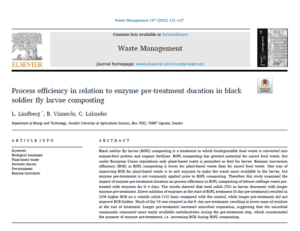 Check out our latest publication in Waste Management Process efficiency in relation to enzyme pre-treatment duration in black soldier fly larvae composting. We investigated the impact of enzyme pre-treatment time duration on the efficiency, in terms of biomass conversion efficiency and material reduction, in black soldier fly larvae (BSFL) composting of lettuce and cabbage (vegetable cuttings from Grönsakshallen Sorunda). We found that direct addition of enzyme (i.e. no pre-treatment time, but adding the enzymes as the same time as the larvae) was the only treatment that significantly improved process efficiency.
Check out our latest publication in Waste Management Process efficiency in relation to enzyme pre-treatment duration in black soldier fly larvae composting. We investigated the impact of enzyme pre-treatment time duration on the efficiency, in terms of biomass conversion efficiency and material reduction, in black soldier fly larvae (BSFL) composting of lettuce and cabbage (vegetable cuttings from Grönsakshallen Sorunda). We found that direct addition of enzyme (i.e. no pre-treatment time, but adding the enzymes as the same time as the larvae) was the only treatment that significantly improved process efficiency.
It resulted in 22% higher biomass conversion efficiency and had the highest respiration (>60% of the inflow VS), thus yielding the smallest amount of residue on a VS basis; around 10% of the initial VS ended up in the residue as compared to >20% in the other treatments. It appeared that the direct application of enzymes yielded the substrate more available to the larvae, while also improving the microbial degradation of the material. As the pre-treatment was conducted at 28 °C, longer pre-treatments resulted in microbial respiration during the pre-treatment, likely resulting in the microorganisms consuming the most easily available carbohydrates indented for the larvae and thus counteracting the purpose of the enzyme pre-treatment. This method shows potential and it would be of interest to evaluate the enzyme pre-treatment on more fiber-rich materials, such as peels from fruits and vegetables. This is something PhD candidate Alice Isibika, who works on BSFL composting of banana and orange peels, currently is looking into.
